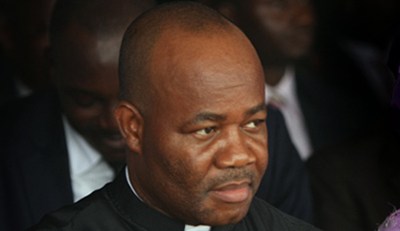The 36 state governors have, again, approved the sharing of another $2 billion among the three tiers of government, Governor Godswil Akpabio of Akwa Ibom has announced.
It is to be released from the Excess Crude Account.
Briefing newsmen after the 49th meeting of the National Economic Council, which comprises the 36 state governors and chaired by Vice President Namadi Sambo, Akpabio said the money will assist in the completion of developmental projects being executed by states across the country.
In January this year, the governors also succeeded in getting presidential approval for the sharing of $1 billion from the same ECA.
They had put pressure on President Goodluck Jonathan in December 2012 to release the said amount.
According to Akpabio: “Council received an update on the status of the Excess Crude Account from the Minister of State for Finance, Alhaji Yerima Ngama.”
Akpabio said the update showed “that $7.82 billion was left in the account, after the sharing of $1 billion by the three tiers of government earlier in the year and payment of fuel subsidy commitments.”
Council, he said, was also told about “plan to share between $1 billion and $2 billion next month to facilitate various development projects being executed by the different tiers of government across the country.”
Also speaking, Governor Ibrahim Dakwambo of Gombe said NEC gave its blessing to the recommendations of a Sub Committee he headed to review a recent presentation by the Minister of Information Technology, Mobolaji Johnson, on a proposed improved, broadband roadmap for the country, to the effect that telecoms service providers should partner with the Federal Government and state sovernments, to ensure proper harmonization and integration of development projects with ICT infrastructure in the country.
Another issue that came up for deliberation was multiple taxation and its effects on the Nigerian economy.
Council considered a report presented by Dakwambo, who heads a Technical Committee on the review of multiple taxation.
The key recommendations include: Review and amendment of the Taxes and Levies; outlawing of the use of unorthodox means to collect taxes and levies; automation of tax operations by relevant tax authorities to eliminate leakages and ensure ease of collection.
Others are that tax authorities must respect the provisions of the law on the use of consultants for tax assessment and collection and to publish the approved list of taxes and levies within the states and local governments to educate the public and facilitate compliance
The Council adopted the recommendations and mandated the National Planning Commission to work with the proposed committee to work out a blueprint for implementation.
Previous ArticleKenya lied about poor reception – NFF
Next Article Governors get NIPP share certificates


